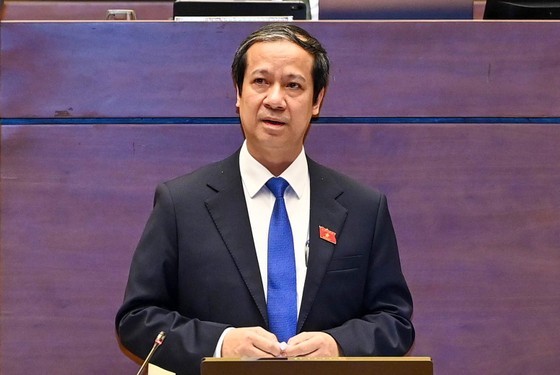 Minister of Education and Training Nguyen Kim Son
Minister of Education and Training Nguyen Kim Son
According to the report on November 1 signed by the Minister of Education and Training Nguyen Kim Son, around 16,265 teachers quit their jobs and moved out of the education sector in the 2021-2022 school year. Of around 16,265 teachers quitting their jobs, some 10,407 teachers were leaving their jobs in public schools while the number of their peers quitting jobs in private educational services was 5,858. Many of them are preschool teachers.
Normally, teachers who quit their jobs and do in other sectors mainly focus on cities with developed socio-economic conditions such as Hanoi, Ho Chi Minh City, the Central City of Da Nang, the southern provinces of Dong Nai, Ba Ria - Vung Tau, and Binh Duong where teachers have many options to find other jobs with higher incomes. Some teachers who quit their jobs will move to work in private schools, others applied for work in companies with higher income than the teaching profession.
Nevertheless, a few localities with difficult socio-economic conditions such as Gia Lai, and Son La also saw a higher number of teachers who quit their jobs than in other localities.
The Minister of Education and Training acknowledged that teachers of public educational institutions decided to leave their jobs because of major reasons such as inadequate salary regimes and policies. Some educational institutions are slow to innovate in management resulting in teachers suffering great work pressure. Plus, infrastructure in public schools has not yet met the professional needs of teachers.
Last but not least, the impact of the market economy and increased demand for teachers must be taken into account. Teachers with good qualifications will tend to look to places with better conditions to find opportunities. Some teachers accepted to quit their jobs and learned other skills to look for better job opportunities.
To keep teachers from quitting their jobs during the great resignation, the Minister of Education and Training proposed the National Assembly to allow the development of a Law on Teachers to improve the legal system related to standards, recruitment, management, and remuneration for teachers to deserve their specific professional labor as well as motivate teachers to devote themselves to the education profession.
 The Ministry of Education and Training makes a proposal to develop a Law on Teachers to beat the odds and keep teachers from leaving their profession.
The Ministry of Education and Training makes a proposal to develop a Law on Teachers to beat the odds and keep teachers from leaving their profession.
He also suggested that the State pay attention to the salary policy and other preferential regimes of educators so that the salary and income of education officials could meet their needs in life.
Regarding pay regimes for new teachers and teachers working on contracts, there should have a support policy to ensure that their income is not lower than the regional minimum wage plus preferential allowances, and study supports to improve professional qualifications and teaching skills.
In addition to the general policy of the State, localities have other support policies on income, working conditions, public housing, and travel for teachers based on their socio-economic conditions.
The Ministry of Education and Training continues to review and amend regulations on working regimes and policies with teachers according to its competence with the aim to motivate and encourage teachers to complete their tasks as well as review regulations on records and books of teachers to reduce teachers’ paperwork pressure and strengthen the application of information technology in management.
In response to the comments of the National Assembly deputies on the issue of tuition fees, Minister of Education and Training Nguyen Kim Son said that the Government issued Decree No. 81/2021/ND-CP stipulating the mechanism of collection and management of tuition fees for educational institutions under the national education system and policies on tuition fee exemption and reduction and support for study expenses and educational services on August 27, 2022.
Due to the impact of educational services on social security, if the roadmap is implemented to fully calculate the cost by 2021, the tuition fee will increase, affecting people's lives.
Accordingly, the government's Decree No. 81/2021 stipulates to keep the tuition fees for the 2021-2022 school year stable, not increased compared to the 2020-2021 school year to share difficulties with people due to the impact of the pandemic.
However, from the school year 2022 - 2023, the annual tuition fee increase will be adjusted in line with the consumer price index and annual economic growth. The annual tuition fee increased by about 7.5 percent a year for preschool education and public general education and 12.5 percent per year for public higher education. This increase is higher than the tuition fee schedule for the 2016-2020 period to offset the growth of the consumer price index.
According to the tuition fee schedule in Decree No. 81/2021, it is expected that by 2025, the cost of public higher education will be fully calculated, and by 2030, the cost of preschool and general education will be fully calculated. Particularly, self-finance schools have a high tuition fee ceiling, 2 or 2.5 times higher than establishments that still receive grants from the government.
Explaining more about tuition fees for the 2022-2023 school year, the head of the Ministry of Education and Training said that the ministry is currently finalizing the Government's draft resolution on tuition fees for public education and training institutions this academic year 2022 – 2023.
The tuition fee rate for the 2022-2023 school year in publicly-funded educational institutions will be equal to the tuition fee for the 2021-2022 school year issued by provincial people's councils in different localities. Local government will consider the support for each educational facility.
Self-financing educational institutions shall establish the tuition fee collection on the basis of economic-technical norms, and cost norms and submit them to the provincial or municipal People's Committee for consideration and approval.
The government encourages localities to allocate budgets to increase recurrent expenditures for educational institutions.
Tuition fee rate for the 2022-2023 school year in higher education institutions and public vocational education institutions maintained equal to the tuition fee for the 2021-2022 school year set by institutions under the provisions of the Government’s Decree No. 81/2021/ND-CP dated August 27, 2021, on collection and management of tuition fees for educational institutions and the policy of tuition fee exemption and reduction, educational services. The State shall provide compensation for tuition fee exemption and reduction according to the tuition fee ceiling for the 2021-2022 school year specified in Decree No. 81/2021.
Localities are encouraged to arrange and mobilize legal resources to support tuition fees for the academic year 2022 - 2023 for students who are studying professions that meet the demand for human resources for industries affected by the Covid-19 epidemic and socio-economic recovery as per the government’s Resolution No. 11 issued on January 30, 2022, on recovery and socio-economic development program.
























